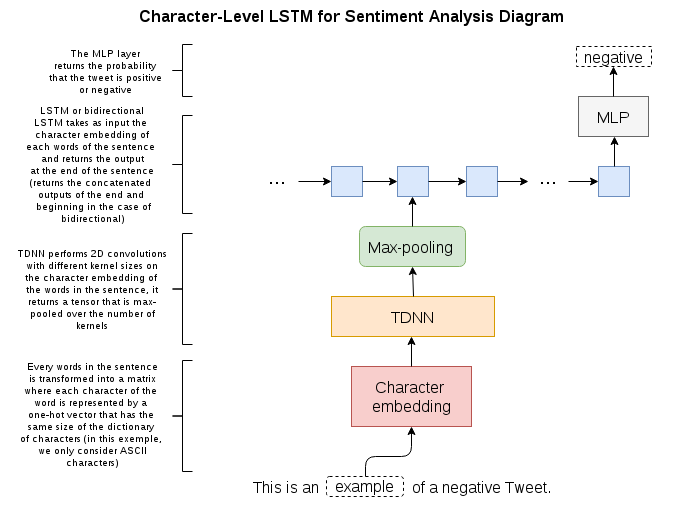- Python 2.7
- NLTK (punkt)
- Tensorflow GPU/CPU version 1.1.0 (NOTE: This code has only been tested to work on this version of Tensorflow!!)
- Download the datasets in
CharLSTM/datasets - Download the Tokenize module of NLTK using
nltk.download() - Change the
PATHvariable in data_utils.py and in the model files - Install the requirements
cd CharLSTM
# Create virtual environment
virtualenv --python==/path/to/python2.7 venv
# Activate venv
source venv/bin/activate
# Install requirements
pip install -r requirements.txt
- Train the model you want with
python main.py <MODEL_NAME> --train
This repository provides a pretrained model for the unidirectional LSTM you can test your own sentences using:
python main.py lstm --sentences 'sentence 1' 'sentence 2' 'etc...'
Both models were trained for more or less 80000 iterations (~ 5 epochs) and achieved similar accuracy on a test set of 80000 tweets.
# (LSTM) Valid loss: 23.50035 -- Valid Accuracy: 0.83613
# (Bidirectional LSTM) Valid loss: 24.41145 -- Valid Accuracy: 0.82714
# Some examples...
# "cant believe i still have to write an essay..", yielded (pos/neg): 0.03065/0.96935, pred: neg
#
# "Why are you concerned with people leaking information youve declassified?" , yielded (pos/neg):
# 0.04639/0.95361, pred: neg
#
# "Virus is going in reverse now, god my guts hurt", yielded (pos/neg): 0.09748/0.90252, pred: neg
# However, it still has problem with sarcasm:
# "his bravery? Haha, you have to be kidding.", yielded (pos/neg): 0.73277/0.26723, pred: pos
You can read the tutorial here.
